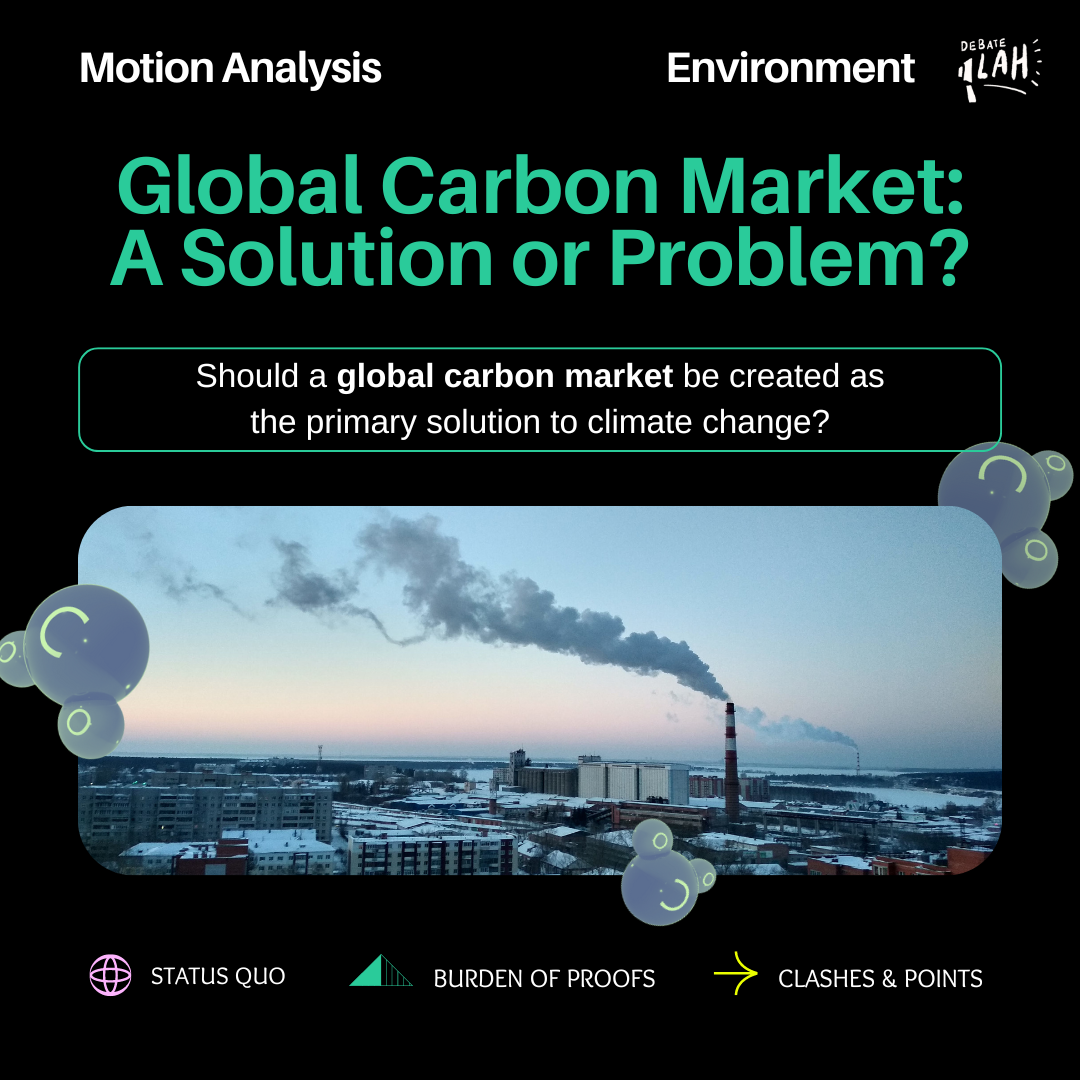Carbon Markets
A carbon market is a system where carbon credits, or permits for a set amount of carbon emissions, are traded. Carbon credits are distributed based on the size of the non-state actors or organizations, market shares, and average emissions of other non-state actors in the same industry.
With carbon emissions being one of the leading factors of environmental pollution, many environmentalists are looking to the creation of a global carbon market as a potential solution. However, would a global carbon market be ultimately effective in combating excessive carbon emissions? Or would it be a hindrance to the use of green technologies in developing countries? With these questions unanswered, let us give you our analysis and argumentation on the motion:
This house would create a global carbon market.
This debate explores potential solutions to long-standing environmental issues. Let us know to what extent you think a global carbon market would aid in resolving such issues!
Status Quo: Prevalent Issue of High Carbon Emissions
Carbon markets are one of many solutions to environmental issues that are actively implemented in several countries, such as China, New Zealand, and Canada. Carbon markets are believed to be effective in countering environmental issues as it puts a limit on an entity’s permitted emissions, therefore controlling and reducing harms towards the environment. Non-state actors must buy or be fined additional permits should they breach their carbon limits. It is estimated that carbon markets would reduce current carbon emission levels to 45% by 2030, and help cut it down to 0% by 2050.
A global carbon market, however, would entail the trade of carbon credits internationally, raising questions on its effectiveness due to concerns of feasibility. There comes the question of whether a global carbon market would be a feasible solution in combating carbon emissions.
With potential issues of the implementation of a global carbon market in mind, the debate then becomes about whether a global carbon market should be created as the primary solution to climate change.
Proponents of the creation of a global carbon market would argue that a global carbon market is able to solve the problem of excessive carbon emissions best as compared to existing alternative solutions.
Opponents of the creation of a global carbon market would argue that a global carbon market is an ultimately flawed solution, pointing out that it would stifle the development and usage of alternative solutions, and proposing alternative solutions such as tech transfers and patent sharing to be better options.
#1 Effectiveness
Proponents argue that global carbon markets effectively reduce emissions that cause climate change through effective distribution of permits. Firstly, they believe global carbon markets to be a feasible solution as large scale carbon markets are currently up and running. For example, the first Emissions Trading System (ETS) was launched by the European Union in 2005. It has proved its effectiveness, contributing to a 41% reduction in the European Union’s industrial carbon emissions. These carbon markets have an existing operational mechanism, that is a “cap-and-trade” principle. A global governing body, in this context, would issue a cap of carbon credits to countries and companies proportionate to their operations. Entities that exceed their carbon limit have no choice but to buy additional credits in order to avoid fines. This system would make a global carbon market effective in solving environmental issues as entities are incentivized to cut down on carbon emissions below their allotted amount so they can sell excess carbon credits to entities who have exceeded their emission limits. These entities would likely cut down on carbon emissions to avoid the need to spend money buying extra credits to accommodate excessive emissions. With this, countries and corporations will likely work to achieve significant carbon reduction.
Opponents say a global carbon market would be ineffective in combating climate change due to the difficulty of enforcing this mechanism on a global scale across dozens of countries and the difficulty to measure carbon emissions. With each country around the world having differing stages of development, political interests and governing systems, trying to implement a global system would be difficult to achieve. The first problem that arises is the incomplete participation of countries in the global carbon market due to lack of resources or differing interests. Developing countries would need to exhaust their limited resources in order to support the issuance of carbon credits and fining entities that exceed their limit. The second problem is potential disagreements on the implementation of this mechanism, such as disputes over whether certain entities should be fined and having different policies for certain countries, as well as a standardised measurement of carbon emissions and pricing for the permits.
#2 Progress in Green Technology Usage
Proponents propose that a global carbon market would be a big step forward for the environmental movement, therefore encouraging the innovation of green technology and the prevention of carbon leakages. The creation of a global carbon market drives countries, organizations and individuals to further develop and invest in green technology in order to meet the allocated limit on carbon emissions. This creates a high demand for green technology such as alternative energy sources and innovations like electric cars that help with carbon reduction.
Technology and industrial procedures that are less sustainable or harmful for the environment would become unfavored as entities would likely rather cut down on emissions than pay extra fines for carbon credits. Sustainable industrial procedures and technology would thus be invented to meet such a demand for ways to achieve carbon reduction, ultimately contributing positively to the environment.
Opponents think that a global carbon market would disproportionately affect smaller developing nations in transitioning to green technology. The difference in economical and social development between developed and developing countries creates an imbalance of ability to fulfil carbon reduction quotas. For example, developing nations likely do not have the resources to fully support participation in a global carbon market, let alone transition to using green technology to contribute to environmental sustainability. Many changes in technology and industrial procedures need to be made to achieve carbon reduction, which leaves little funding left for the development of green technology. For developing countries, it is much better for them to directly transition to using green technologies that would lessen environmental impacts rather than participate in a global carbon market where they likely have to purchase carbon credits due to inability to use green technologies to significantly reduce carbon emissions.
#3 Economic Impacts
Proponents claim that a global carbon market would be the most economically feasible and optimal solution. The creation of a global carbon market focuses more on the implementation of said mechanism on a global scale rather than needing to invest large amounts of money on products or solutions. The cost of permits are borne by countries and corporations, and will be priced reasonably to ensure that countries are able to participate in the market. As the global carbon market would only set a price on a certain amount of carbon emissions rather than mandate specific technologies or practices, countries and companies can find cost-effective ways to meet carbon reduction targets. With this, the problem of excessive carbon emissions would be solved at the root as entities work to reduce emissions to fit costs. This proves that the creation of a global carbon market is a much better solution when most entities globally are prompted to cut down on emissions rather than primarily rely on alternative solutions that either cost more to implement or are harder to enforce.
Opponents state that commodification of carbon emissions hinders the transition to green technology. They argue that the market would cause entities to be more profit driven rather than focus on being environmentally sustainable. The flaws of the market show when entities care less about using green technology in industrial procedures and find loopholes to bypass the measurement of carbon emissions. Examples of this include double-counting carbon credits on purpose and potentially investing in non-verified carbon credits. Consequently, the effectiveness of a global carbon market in proposition’s world would be nothing more than a mirage as entities will find ways to avoid paying fines for additional credits while also not having to take action to transition to more sustainable operating methods. The commodification aspect of this mechanism could deteriorate the momentum of using green technology and other methods that would reduce emissions.
Burden of Proofs
After understanding potential argumentation points from both ends, it’s your turn to evaluate whether each side has provided sufficient proof and analysis to support their stance.
Proponents should prove that global carbon markets are the only way to solve climate change and prompt opposition to prove a successful counter policy.
Opponents should prove that the global carbon market has inherent flaws that destroy other viable alternatives rather than focusing on proving a successful counter policy.
Should a global carbon market be created as a primary solution to climate change? Would a global carbon market significantly contribute to the environmental movement? Or would it hinder the transition to alternatives like green technology?
That was a deep dive!
Here's a document that summaries all you need to know about understanding both ends of the topic at hand.
You may use this for mock debates, or just to develop an understanding of global carbon markets!
Environmental motions require extensive research to understand and tackle, so we’ve linked some relevant resources below to get you started!
- https://climate.ec.europa.eu/eu-action/eu-emissions-trading-system-eu-ets/international-carbon-market_en#:~:text=Besides%20the%20EU%20emissions%20trading,Switzerland%20and%20the%20United%20States on international carbon markets and existing carbon markets
- https://climatepromise.undp.org/news-and-stories/what-are-carbon-markets-and-why-are-they-important on carbon markets, their importance and challenges
- https://www.investopedia.com/terms/g/green_tech.asp#:~:text=Green%20tech%E2%80%93or%20green%20technology,%2C%20material%20science%2C%20and%20hydrology on green technology
- https://earth.org/is-carbon-offset-a-form-of-greenwashing/ on greenwashing
Authors: Jacquelyn Hon, Chloe Koh

